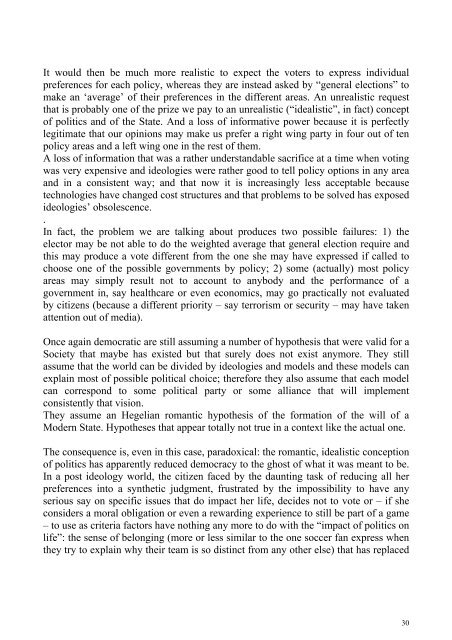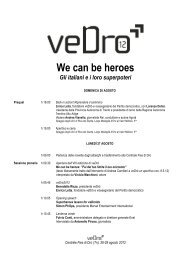democracy - Vision the Italian Think Tank
democracy - Vision the Italian Think Tank
democracy - Vision the Italian Think Tank
You also want an ePaper? Increase the reach of your titles
YUMPU automatically turns print PDFs into web optimized ePapers that Google loves.
It would <strong>the</strong>n be much more realistic to expect <strong>the</strong> voters to express individualpreferences for each policy, whereas <strong>the</strong>y are instead asked by “general elections” tomake an ‘average’ of <strong>the</strong>ir preferences in <strong>the</strong> different areas. An unrealistic requestthat is probably one of <strong>the</strong> prize we pay to an unrealistic (“idealistic”, in fact) conceptof politics and of <strong>the</strong> State. And a loss of informative power because it is perfectlylegitimate that our opinions may make us prefer a right wing party in four out of tenpolicy areas and a left wing one in <strong>the</strong> rest of <strong>the</strong>m.A loss of information that was a ra<strong>the</strong>r understandable sacrifice at a time when votingwas very expensive and ideologies were ra<strong>the</strong>r good to tell policy options in any areaand in a consistent way; and that now it is increasingly less acceptable becausetechnologies have changed cost structures and that problems to be solved has exposedideologies’ obsolescence..In fact, <strong>the</strong> problem we are talking about produces two possible failures: 1) <strong>the</strong>elector may be not able to do <strong>the</strong> weighted average that general election require andthis may produce a vote different from <strong>the</strong> one she may have expressed if called tochoose one of <strong>the</strong> possible governments by policy; 2) some (actually) most policyareas may simply result not to account to anybody and <strong>the</strong> performance of agovernment in, say healthcare or even economics, may go practically not evaluatedby citizens (because a different priority – say terrorism or security – may have takenattention out of media).Once again democratic are still assuming a number of hypo<strong>the</strong>sis that were valid for aSociety that maybe has existed but that surely does not exist anymore. They stillassume that <strong>the</strong> world can be divided by ideologies and models and <strong>the</strong>se models canexplain most of possible political choice; <strong>the</strong>refore <strong>the</strong>y also assume that each modelcan correspond to some political party or some alliance that will implementconsistently that vision.They assume an Hegelian romantic hypo<strong>the</strong>sis of <strong>the</strong> formation of <strong>the</strong> will of aModern State. Hypo<strong>the</strong>ses that appear totally not true in a context like <strong>the</strong> actual one.The consequence is, even in this case, paradoxical: <strong>the</strong> romantic, idealistic conceptionof politics has apparently reduced <strong>democracy</strong> to <strong>the</strong> ghost of what it was meant to be.In a post ideology world, <strong>the</strong> citizen faced by <strong>the</strong> daunting task of reducing all herpreferences into a syn<strong>the</strong>tic judgment, frustrated by <strong>the</strong> impossibility to have anyserious say on specific issues that do impact her life, decides not to vote or – if sheconsiders a moral obligation or even a rewarding experience to still be part of a game– to use as criteria factors have nothing any more to do with <strong>the</strong> “impact of politics onlife”: <strong>the</strong> sense of belonging (more or less similar to <strong>the</strong> one soccer fan express when<strong>the</strong>y try to explain why <strong>the</strong>ir team is so distinct from any o<strong>the</strong>r else) that has replaced30





